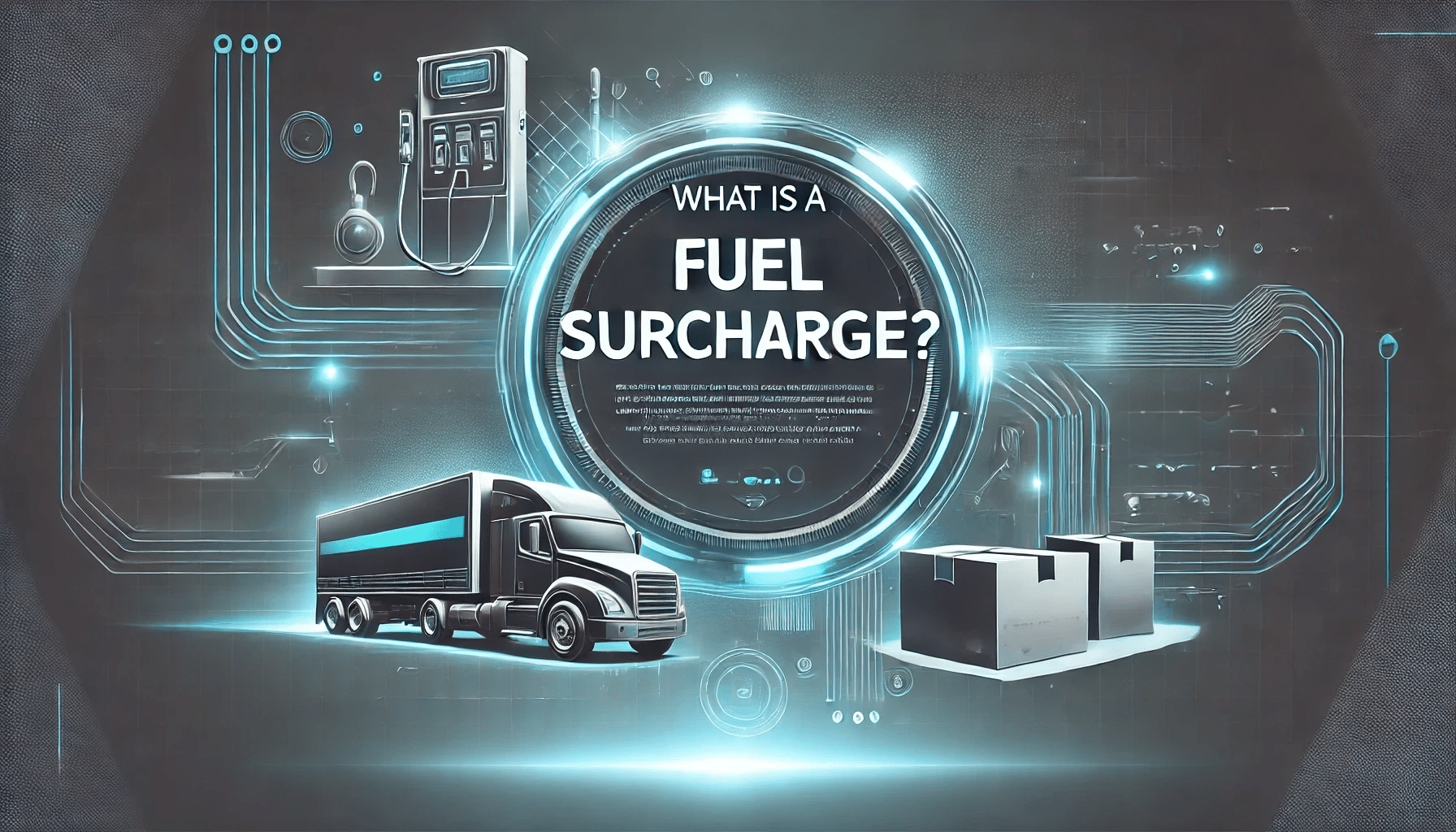A fuel surcharge is a fee added by carriers to cover changing fuel costs. It helps manage financial risks due to fuel price changes.
Fuel costs can vary extensively on a weekly, monthly, and especially yearly basis. It’s impossible for carriers to perfectly forecast and quote accurate fuel costs for every shipment, which is where fuel surcharges come in.
In this piece, we’ll tell you what a fuel surcharge is, how it’s calculated, and what you can do to combat its added cost.
Key Takeaways
-
Fuel surcharges are essential fees that trucking companies charge to manage fluctuating diesel fuel costs, enabling stable operations and profitability.
-
Calculating fuel surcharges involves understanding base fuel prices and vehicle fuel mileage, ensuring transparent and fair charge assessments.
-
Shippers can minimize fuel surcharges by lowering costs through negotiation, utilizing third-party logistics providers, and making strategic shipping choices.
What Is A Fuel Surcharge?
A fuel surcharge is an added fee that trucking companies charge to cover the costs of diesel fuel. Shippers pay these fees in addition to standard freight rates, helping carriers manage fluctuating fuel prices and remain profitable even during unexpected fuel price spikes.
Fuel surcharges can benefit both shippers and carriers, as they offer a structured method to share the burden of fuel price volatility. Without it, shipping costs would fluctuate extensively and become much harder for shippers to forecast effectively compared to simple fee systems used by most carriers.
The Purpose of Fuel Surcharges
Fuel surcharges protect carriers from volatile fuel prices that can hurt their already razor-thin margins, allowing them to operate more reliably so you don’t have to worry about sudden delivery issues. Without them, carriers would struggle to stay competitive and manage costs during rising fuel prices.
How to Calculate Fuel Surcharges

Fuel surcharges apply when the actual price of fuel exceeds the base fuel price established by the carrier. Carriers generally use the national average diesel fuel price that’s reported by the U.S. Energy Information Administration each week.
Carriers generally use one of two primary strategies for calculating your added surcharges for fluctuating diesel fuel prices: per-mile and per-shipment calculations.
Per-Mile Fuel Surcharges
You can either use a total fuel surcharge calculator or manually determine your added costs using the base fuel price and current fuel price.
Start by subtracting the two numbers, then divide this difference by the vehicle’s average miles per gallon (MPG) provided by the carrier. Then, multiply that per-mile cost by the total distance traveled to determine your added costs.
Here’s a per-mile fuel surcharge example: A $4 base cost and $5 average fuel price for trucks that get 5 MPG would create a fuel surcharge of $0.20 per mile, or $20 for a 100-mile shipment. (5-4 = 1; 1/5 = 0.20; 0.20 x 100 = 20)
Alternatively, some carriers use a simple method of $0.01 per mile for every $0.06 difference between the base and actual fuel costs. For example, a base fuel rate of $3 and a current price of $3.60 would add $0.10 per mile to the overall fuel costs.
Percentage of Load Price
Another method of calculating fuel surcharges is applying a flat percentage to the load price based on the actual fuel cost. Generally, carriers provide a pricing chart that establishes fuel price ranges that each have their own surcharge that applies, like the following:
|
At Least |
Less Than |
Surcharge Percentage |
Surcharge on $100 Shipment |
Total Cost |
|---|---|---|---|---|
|
$2.51 |
$2.75 |
9% |
$9 |
$109.00 |
|
$2.76 |
$3.00 |
9.25% |
$9.25 |
$109.25 |
|
$3.01 |
$3.25 |
9.5% |
$9.50 |
$109.50 |
Each carrier has its own base rate where surcharges begin applying, price ranges where higher surcharges apply, and surcharge percentages they charge, so make sure you understand their method to avoid significant cost increases.
Can You Reduce Fuel Surcharges?

Reducing fuel surcharges generally comes down to two practices: negotiating with carriers and optimizing your logistics to lower shipping costs as a whole.
While carriers generally use fixed fuel surcharge rates, there is some room for negotiation. Reduced per-mile or percentage-based surcharge rates can directly lower your added costs, but they’re not easy to get without the help of a third-party logistics provider like Zero Down that has extensive experience negotiating with carriers.
You can also control fuel surcharges by optimizing your shipping efficiency and performance, resulting in lower shipping costs and reduced fuel use. There are a lot of strategies you can use to improve your logistics, including:
-
Freight and Parcel Audit: A freight and parcel audit finds overcharges that increase your shipping costs through miscalculated package dimensions and weights, incorrect fees or base rate calculations, and misapplied discounts.
-
Route Optimization: Efficient routing reduces the number of miles drivers take to complete deliveries, which lowers your shipping costs and fuel surcharges that depend on the distance shipments travel.
-
Packaging Optimization: With packaging optimization, you can minimize wasted space to shrink packages so more can fit in each truckload and find lightweight materials that reduce the amount of fuel it takes to transport packages.
-
Load Consolidation: Similar to packaging optimization, effective load consolidation strategies that let you fit more packages into each load can help reduce your shipping costs per package, making each surcharge less impactful.
At the same time, you can compare carriers to lower your base costs, add additional service levels, and find a fuel surcharge calculation that’s more cost-effective for your business.
Understand Fuel Surcharges to Improve Your Shipping Spend Management
Fuel surcharges are just one small part of your overall shipping costs, but if you don’t account for them, they can drastically affect your bottom line. You must understand what fuel surcharges are and how they’re calculated to help you better plan and budget for these extra fees.
With different calculation methods, various base rates, and variable surcharge percentages applied to your loads by each carrier, it’s hard to manage fuel surcharges alone. Fortunately, working with logistics experts allows you to negotiate the best rates and optimize the rest of your shipping costs to reduce the impact of surcharges so both you and your carriers can remain profitable.
If you’re looking for ways to reduce your shipping spend, contact Zero Down today.
Frequently Asked Questions
What is a fuel surcharge?
A fuel surcharge is an extra charge added by trucking companies to offset the rising costs of diesel fuel, which is paid by shippers in addition to standard freight rates. As fuel prices fluctuate, surcharges change as well.
How are fuel surcharges calculated?
Fuel surcharges are calculated by taking the difference between the base fuel price and the current fuel price, dividing that by the vehicle’s average miles per gallon, and then multiplying by the total distance traveled, or by calculating a flat percentage per load.
Can fuel surcharges be negotiated?
Fuel surcharges are typically non-negotiable, but you can negotiate a lower base fuel rate before finalizing a contract with the carrier to help reduce overall shipping expenses.
How do carriers apply fuel surcharges?
Carriers typically apply fuel surcharges either as a per-mile rate or as a percentage of the load price, depending on the current fuel costs and the particulars of the shipment.
What strategies can help reduce fuel surcharges?
To effectively reduce fuel surcharges, lower your shipping costs, negotiate lower base fuel rates, and collaborate with an experienced third-party logistics provider for better shipping discounts.
Brad McBride, CEO and Founder of Zero Down Supply Chain Solutions is a dynamic leader with over 30 years of experience in the supply chain sector. His journey began at Consolidated Freightways in 1988, where he mastered freight logistics and pricing. His career led him to Eagle Global Logistics, diving into international freight forwarding and leading high-volume shipping projects.
Read More



